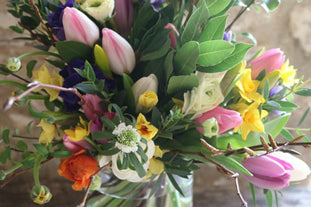January 2021 News

In some ways I wish I’d written a blithe, salesey newsletter before the end of December, but a combination of sloth and foreboding had me holding off… and here we find ourselves back in lockdown with at least six weeks of the gloomiest time of year to get through. Feeling gloomy is usually Fabrizio’s corner with him bagging the family Eeyore spot, but today he really shook me up and got me to think positive – and as usual that means looking at the garden.
So here is a little game of I spy for you to play in your garden – or if you have no garden, when you’re out on your daily allotted exercise in a park or walking down a street where there are other people’s gardens for you to take pleasure in.
1. Spot a winter flowering tree or shrub or clematis – I’m reliably informed there is mimosa flowering in London, here we have tiny flourishes of viburnum bodnantense with its glorious scent, and occasional flowers on the winter flowering honeysuckle, and the tiny little flowers on the winter flowering box are just taking shape. The viburnum and sarcococca are in the bed I pass at night when taking the dog for her last pee and the scent takes me by surprise again and again though they’ve been there for seventeen years
2. Leave seedheads and see if you can spot birds feeding on them: I just this minute took Tea Cake up the field for a spin and came across a gang (they call them a charm, but I think they’re much more ganglike!) of goldfinches feeding on the willowherb seedheads. I know it’s tempting to tidy hard in a garden at this time of year, but it is the hungriest month for garden birds, and while a fat ball and seeds on a bird feeder will help, seed heads on plants provide food and cover for birds and lots of space for hibernating insects which the birds will also feed on and which will feed on your aphid population explosion next May. If you have apple trees and leave the windfalls then you’ll find fieldfare and redwing, flying south from Scandinavia for the winter, will come and feast on them. If you are planning to cut a hedge now is the ideal time as birds aren’t nesting. However, if you can leave sections of hedge each year so that you cut your hedges on a less aggressive rotation, you’ll find that birds come to feast on remaining berries, and if it’s a flowering hedge, like a hawthorn or blackthorn, an uncut hedge will give you amazing blossom in the spring which will smell delicious and give great forage to the bees.
3. Leave compost heaps if you can as there may be people hibernating in them: slow worms, grass snakes, hedgehogs, toads, newts, frogs, all love a cosy nest in a compost heap – so if you can leave them till the spring the wildlife will love you for it. This is not an I spy point as obviously the point is not to disturb… However, if you have any kind of bug hotel (and compost heap surrounds often work well as bug hotels,) look for holes which have been filled with what looks like a little squirt of mortar. These are the nests of solitary bees, and in the nest will be an egg waiting to hatch in the spring. If you get your eye in you may find these little mortared holes all over the place in piles of wood or walls of old stone. The wall outside our back door is filled with mortared holes and in the spring and summer humms with hatched bees, or bees laying new eggs.
4. This is a final 'I spy' – have a look in your wild patches and see if you can identify perennials nestling in the sward. Fabrizio can be caught most afternoons at the moment counting pyramidal orchids which have spread from their original home quite far (maybe three hundred metres,) to another patch of drier meadow. He’s very excited about this and comes in really much less Eeyoreish than he would otherwise be. Meanwhile I’m spotting the emerging crowns of primroses and the promising spikes of wild bluebells.
Meanwhile we start sending out flowers again from next week – we generally sell out for the week ahead on Friday afternoon so if you’d like to order flowers it’s always worth trying to remember to order the week before.
And we start our online workshops again next week too. Do book a place – I’m reliably informed that our online sessions are the inspiring, enabling sessions I want them to be. If you’re unsure, see our Google Reviews to find out more (and if you’ve enjoyed any of our workshops a google review from you would be very kind and incredibly useful – for people with small businesses I’ll explain why at our social media workshop on 24th Feb.) We have a great selection of online workshops for people running small businesses, not exclusively for flower growers, but for flower growers too. And lots of cheery online demos too to inspire you to head out into your garden and hone your garden floristry skills.
So so long for now, have fun in your gardens while this lockdown keeps us at home, and I’ll see you at an online workshop here soon.
Georgie xxx








